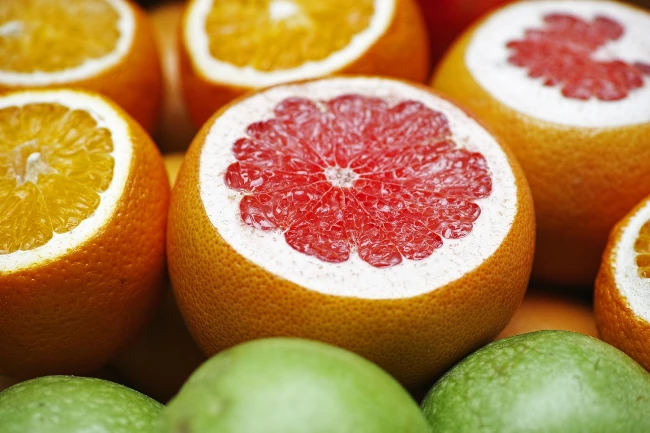Vitamin P, better known as flavonoids, is a group of plant-derived compounds that play an essential role in human health. While not classified as true vitamins, flavonoids contribute significantly to wellness by offering antioxidant, anti-inflammatory, and other health-promoting properties.
This article delves into the types of flavonoids, their health benefits, and guidance on their optimal intake through food and supplements.
What are Flavonoids
Flavonoids are a diverse group of naturally occurring compounds found in plants, known for their vivid colors and a wide range of health-promoting properties.
They belong to the polyphenol family and are responsible for the pigmentation in fruits, vegetables, flowers, and even some beverages like tea and wine.
Despite often being referred to as “Vitamin P,” flavonoids are not actual vitamins. However, they are essential for their significant contribution to human health, particularly due to their powerful antioxidant and anti-inflammatory effects.
These compounds are produced by plants as a defense mechanism against environmental stressors such as UV radiation, pests, and pathogens. In humans, flavonoids mimic this protective role by combating oxidative stress and inflammation, which are underlying factors in numerous chronic diseases.
Flavonoids also support various bodily functions, including improving cardiovascular health, enhancing immune responses, and promoting brain health.
There are six major types of flavonoids – flavonols, flavones, isoflavones, flavanones, flavanols, and anthocyanin – each with unique chemical structures and health benefits. For instance, anthocyanins give berries their deep purple and blue hues, while flavanols in cocoa contribute to its heart-healthy reputation.
By consuming a diet rich in flavonoid-containing foods, such as citrus fruits, green tea, and leafy greens, individuals can tap into a broad spectrum of benefits that these natural compounds offer.
Research into flavonoids continues to reveal their potential for preventing and managing chronic diseases, from heart disease and cancer to neurodegenerative disorders.
These findings underscore the importance of including a variety of flavonoid-rich foods in daily diets to support long-term health and vitality.
Types of Flavonoids and Food Sources
Flavonoids are classified into six major subgroups, each found in various fruits, vegetables, and beverages:
- Flavonols
- Sources: Onions, kale, broccoli, apples, and berries.
- Notable Compound: Quercetin, known for its anti-inflammatory properties.
- Flavones
- Sources: Parsley, celery, and hot peppers.
- Notable Compound: Luteolin, which supports immune health.
- Isoflavones
- Sources: Soybeans and soy products like tofu and miso.
- Notable Compound: Genistein, linked to hormonal balance.
- Flavanones
- Sources: Citrus fruits such as oranges, lemons, and grapefruits.
- Notable Compound: Hesperidin, beneficial for cardiovascular health.
- Flavanols
- Sources: Green tea, cocoa, and grapes.
- Notable Compounds: Catechins, which are potent antioxidants.
- Anthocyanins
- Sources: Blueberries, blackberries, cherries, and red cabbage.
- Notable Compound: Cyanidin, known for its anti-aging benefits.
Incorporating a diverse range of these foods into your diet ensures a balanced intake of flavonoids.
Health Benefits of Flavonoids
Flavonoids contribute to health in multiple ways:
- Antioxidant Support
Flavonoids neutralize free radicals, protecting cells from oxidative damage that can lead to chronic diseases like cancer and cardiovascular disorders. - Anti-Inflammatory Effects
They help reduce inflammation, which plays a role in conditions such as arthritis, asthma, and autoimmune diseases. - Cardiovascular Health
Flavonoids improve blood vessel function, reduce bad cholesterol levels, and lower blood pressure, reducing the risk of heart attacks and strokes. - Brain Health
Some flavonoids, such as those in cocoa and berries, support cognitive function and protect against neurodegenerative diseases like Alzheimer’s. - Immune System Boost
Flavonoids enhance the immune response, helping the body fight infections and recover faster from illnesses.
Dosage and Supplements
How Much Flavonoid Intake Is Optimal?
The recommended intake of flavonoids varies, but experts suggest aiming for a diet rich in fruits, vegetables, and plant-based beverages to meet daily needs naturally. Consuming at least five servings of fruits and vegetables per day ensures a sufficient flavonoid intake.
When to Consider Supplements
Flavonoid supplements, such as quercetin or citrus bioflavonoids, can be beneficial for individuals with dietary restrictions, chronic conditions, or specific health goals.
Dosage Recommendations
- Quercetin: 500–1,000 mg per day for antioxidant and anti-inflammatory effects.
- Hesperidin: 500 mg per day to support cardiovascular health.
Always consult with a healthcare professional before beginning supplementation, as excessive intake may lead to side effects or interact with medications.
Conclusion
Vitamin P, or flavonoids, is a powerhouse of health benefits that enhances immunity, heart health, and more. By incorporating a variety of flavonoid-rich foods into your diet and considering supplements when necessary, you can harness their full potential to support your well-being. Whether through a bowl of vibrant berries or a cup of green tea, prioritizing flavonoids is a delicious step toward a healthier life.
